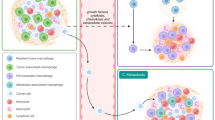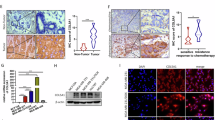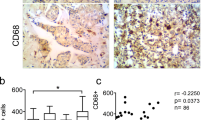Abstract
A growing body of evidence indicates that interactions between neoplastic cells and tumor-associated macrophages (TAMs) in the tumor microenvironment (TME) are crucial in promoting tumor cell invasion and progression. Macrophages have an ambiguous role in these processes as this M1 phenotype correlates with tumoricidal capacity, whereas TAMs of M2 phenotype exert tumor-promoting effects. In this study, we provide evidence that interactions between mouse breast tumor cells and TAMs remodel the TME, leading to the upregulation of Fra-1, a member of the FOS family of transcription factor. In turn, this proto-oncogene initiates activation of the IL-6/JAK/Stat3 signaling pathway. This creates a malignant switch in breast tumor cells, leading to increased release of proangiogenic factors MMP-9, vascular endothelial growth factor and transforming growth factor-β from tumor cells and intensified invasion and progression of breast cancer. Proof of the concept for the crucial role played by transcription factor Fra-1 in regulating these processes was established by specific knockdown of Fra-1 with small interfering RNA, which resulted in a marked suppression of tumor cell invasion, angiogenesis and metastasis in a mouse breast cancer model. Such a strategy could eventually lead to future efficacious treatments of metastatic breast cancer.
This is a preview of subscription content, access via your institution
Access options
Subscribe to this journal
Receive 50 print issues and online access
$259.00 per year
only $5.18 per issue
Buy this article
- Purchase on Springer Link
- Instant access to full article PDF
Prices may be subject to local taxes which are calculated during checkout







Similar content being viewed by others
References
Adiseshaiah P, Peddakama S, Zhang Q, Kalvakolanu DV, Reddy SP . (2005). Mitogen regulated induction of FRA-1 proto-oncogene is controlled by the transcription factors binding to both serum and TPA response elements. Oncogene 24: 4193–4205.
Allavena P, Sica A, Solinas G, Porta C, Mantovani A . (2008). The inflammatory micro-environment in tumor progression: the role of tumor-associated macrophages. Crit Rev Oncol Hematol 66: 1–9.
Asschert JG, de Vries EG, De JS, Withoff S, Vellenga E . (1999). Differential regulation of IL-6 promoter activity in a human ovarian-tumor cell line transfected with various p53 mutants: involvement of AP-1. Int J Cancer 81: 236–242.
Balkwill F, Charles KA, Mantovani A . (2005). Smoldering and polarized inflammation in the initiation and promotion of malignant disease. Cancer Cell 7: 211–217.
Bronte V, Zanovello P . (2005). Regulation of immune responses by l-arginine metabolism. Nat Rev Immunol 5: 641–654.
Condeelis J, Pollard JW . (2006). Macrophages: obligate partners for tumor cell migration, invasion, and metastasis. Cell 124: 263–266.
Coussens LM, Tinkle CL, Hanahan D, Werb Z . (2000). MMP-9 supplied by bone marrow-derived cells contributes to skin carcinogenesis. Cell 103: 481–490.
Darnell Jr JE . (2002). Transcription factors as targets for cancer therapy. Nat Rev Cancer 2: 740–749.
Faggioli L, Costanzo C, Donadelli M, Palmieri M . (2004). Activation of the Interleukin-6 promoter by a dominant negative mutant of c-Jun. Biochim Biophys Acta 1692: 17–24.
Fraser CC, Chen BP, Webb S, van RN, Kraal G . (1995). Circulation of human hematopoietic cells in severe combined immunodeficient mice after Cl2MDP-liposome-mediated macrophage depletion. Blood 86: 183–192.
Gao SP, Mark KG, Leslie K, Pao W, Motoi N, Gerald WL et al. (2007). Mutations in the EGFR kinase domain mediate STAT3 activation via IL-6 production in human lung adenocarcinomas. J Clin Invest 117: 3846–3856.
Guiducci C, Vicari AP, Sangaletti S, Trinchieri G, Colombo MP . (2005). Redirecting in vivo elicited tumor infiltrating macrophages and dendritic cells towards tumor rejection. Cancer Res 65: 3437–3446.
Hagemann T, Robinson SC, Schulz M, Trumper L, Balkwill FR, Binder C . (2004). Enhanced invasiveness of breast cancer cell lines upon co-cultivation with macrophages is due to TNF-alpha dependent up-regulation of matrix metalloproteases. Carcinogenesis 25: 1543–1549.
Hiratsuka S, Watanabe A, Aburatani H, Maru Y . (2006). Tumour-mediated upregulation of chemoattractants and recruitment of myeloid cells predetermines lung metastasis. Nat Cell Biol 8: 1369–1375.
Hodge DR, Hurt EM, Farrar WL . (2005). The role of IL-6 and STAT3 in inflammation and cancer. Eur J Cancer 41: 2502–2512.
Knudsen E, Iversen PO, van RN, Benestad HB . (2002). Macrophage-dependent regulation of neutrophil mobilization and chemotaxis during development of sterile peritonitis in the rat. Eur J Haematol 69: 284–296.
Kortylewski M, Kujawski M, Wang T, Wei S, Zhang S, Pilon-Thomas S et al. (2005). Inhibiting Stat3 signaling in the hematopoietic system elicits multicomponent antitumor immunity. Nat Med 11: 1314–1321.
Kortylewski M, Yu H . (2008). Role of Stat3 in suppressing anti-tumor immunity. Curr Opin Immunol 20: 228–233.
Leek RD, Harris AL . (2002). Tumor-associated macrophages in breast cancer. J Mammary Gland Biol Neoplasia 7: 177–189.
Lewen S, Zhou H, Hu HD, Cheng T, Markowitz D, Reisfeld RA et al. (2008). A Legumain-based minigene vaccine targets the tumor stroma and suppresses breast cancer growth and angiogenesis. Cancer Immunol Immunother 57: 507–515.
Lewis CE, Pollard JW . (2006). Distinct role of macrophages in different tumor microenvironments. Cancer Res 66: 605–612.
Lin EY, Li JF, Bricard G, Wang W, Deng Y, Sellers R et al. (2007). Vascular endothelial growth factor restores delayed tumor progression in tumors depleted of macrophages. Mol Oncol 1: 288–302.
Lin EY, Nguyen AV, Russell RG, Pollard JW . (2001). Colony-stimulating factor 1 promotes progression of mammary tumors to malignancy. J Exp Med 193: 727–740.
Lin EY, Pollard JW . (2007). Tumor-associated macrophages press the angiogenic switch in breast cancer. Cancer Res 67: 5064–5066.
Luo Y, Zhou H, Krueger J, Kaplan C, Lee SH, Dolman C et al. (2006). Targeting tumor-associated macrophages as a novel strategy against breast cancer. J Clin Invest 116: 2132–2141.
Mantovani A, Schioppa T, Porta C, Allavena P, Sica A . (2006). Role of tumor-associated macrophages in tumor progression and invasion. Cancer Metastasis Rev 25: 315–322.
Martinez FO, Sica A, Mantovani A, Locati M . (2008). Macrophage activation and polarization. Front Biosci 13: 453–461.
Milde-Langosch K . (2005). The Fos family of transcription factors and their role in tumourigenesis. Eur J Cancer 41: 2449–2461.
Philips A, Teyssier C, Galtier F, Rivier-Covas C, Rey JM, Rochefort H et al. (1998). FRA-1 expression level modulates regulation of activator protein-1 activity by estradiol in breast cancer cells. Mol Endocrinol 12: 973–985.
Pollard JW . (2004). Tumour-educated macrophages promote tumour progression and metastasis. Nat Rev Cancer 4: 71–78.
Sica A, Schioppa T, Mantovani A, Allavena P . (2006). Tumour-associated macrophages are a distinct M2 polarised population promoting tumour progression: potential targets of anti-cancer therapy. Eur J Cancer 42: 717–727.
van RN . (1989). The liposome-mediated macrophage ‘suicide’ technique. J Immunol Methods 124: 1–6.
van RN, Sanders A . (1994). Liposome mediated depletion of macrophages: mechanism of action, preparation of liposomes and applications. J Immunol Methods 174: 83–93.
Yu H, Kortylewski M, Pardoll D . (2007). Crosstalk between cancer and immune cells: role of STAT3 in the tumour microenvironment. Nat Rev Immunol 7: 41–51.
Zajchowski DA, Bartholdi MF, Gong Y, Webster L, Liu HL, Munishkin A et al. (2001). Identification of gene expression profiles that predict the aggressive behavior of breast cancer cells. Cancer Res 61: 5168–5178.
Zerbini LF, Wang Y, Cho JY, Libermann TA . (2003). Constitutive activation of nuclear factor kappaB p50/p65 and Fra-1 and JunD is essential for deregulated interleukin 6 expression in prostate cancer. Cancer Res 63: 2206–2215.
Acknowledgements
We thank K Cairns for editorial assistance. This work was supported by grants from the National Science Foundation of China (NSFC): Grant 30672389 (to RX), NSFC 973 program Grant 2007CB914804 (to RX), and NSFC 863 program Grant 2007AA021010 (to RX), Grant No. 30671983 from The National Natural Science Foundation of China (to YL); grant from NIH CA 115751 (to RAR); and Grant SFP 1645 from the EMD Lexigen Research Center (to RAR). This is The Scripps Research Institute's manuscript number 19572-IMM.
Author information
Authors and Affiliations
Corresponding authors
Additional information
Supplementary Information accompanies the paper on the Oncogene website (http://www.nature.com/onc)
Supplementary information
Rights and permissions
About this article
Cite this article
Luo, Y., Zhou, H., Krueger, J. et al. The role of proto-oncogene Fra-1 in remodeling the tumor microenvironment in support of breast tumor cell invasion and progression. Oncogene 29, 662–673 (2010). https://doi.org/10.1038/onc.2009.308
Received:
Revised:
Accepted:
Published:
Issue Date:
DOI: https://doi.org/10.1038/onc.2009.308
Keywords
This article is cited by
-
The Streptococcus virulence protein PepO triggers anti-tumor immune responses by reprograming tumor-associated macrophages in a mouse triple negative breast cancer model
Cell & Bioscience (2023)
-
NRG1 regulates Fra-1 transcription and metastasis of triple-negative breast cancer cells via the c-Myc ubiquitination as manipulated by ERK1/2-mediated Fbxw7 phosphorylation
Oncogene (2022)
-
A bi-directional dialog between vascular cells and monocytes/macrophages regulates tumor progression
Cancer and Metastasis Reviews (2021)
-
The nuclear oncoprotein Fra-1: a transcription factor knocking on therapeutic applications’ door
Oncogene (2020)
-
Expression and function of FRA1 protein in tumors
Molecular Biology Reports (2020)



